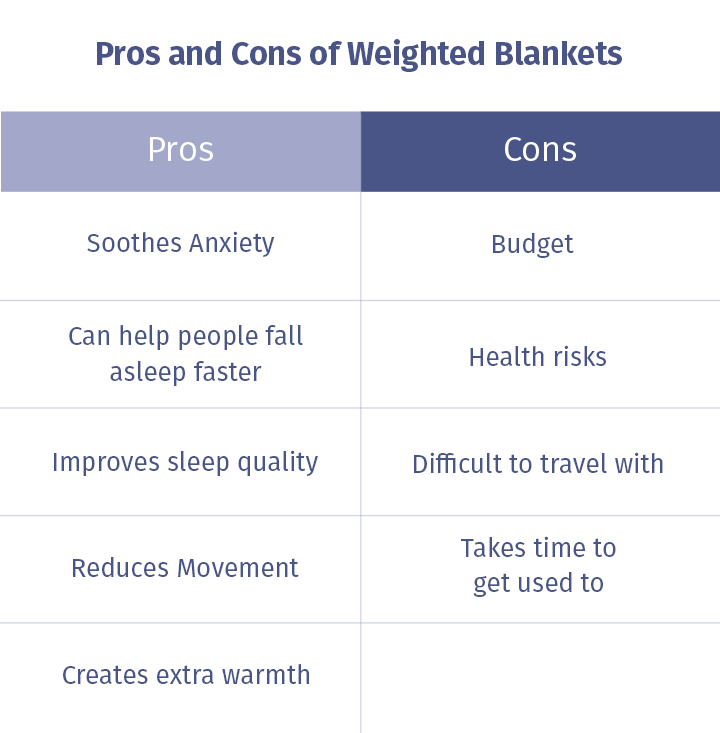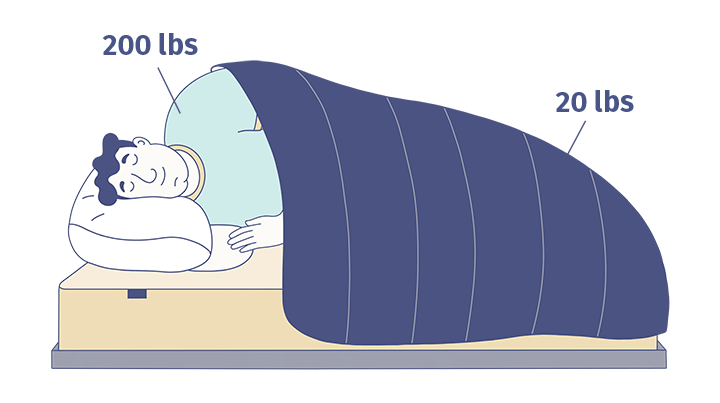Weighted blankets can help alleviate anxiety and promote restful sleep, but those aren’t the only reasons people love them. For some folks, these heavy blankets can even help them fall asleep faster.
But, like all things, weighted blankets don’t work for everyone. If you’re on the fence about buying one of these popular products, take a look at our weighted blanket pros and cons. By the end of this article, you should have a clear understanding about how these comfy blankets work.

Pros of Sleeping With a Weighted Blanket
First of all, let’s examine the good stuff. Here are the top five reasons why people love weighted blankets.
Soothes Anxiety
Anxiety brings about many physical symptoms, such as shallow breathing and increased heart rate. When this happens, the body enters fight or flight mode. Weighted blankets can help combat this feeling by creating something called deep pressure touch (DPT), which helps release serotonin and dopamine. These feel-good hormones help bring the body out of fight mode and back to rest. Thanks to these calming properties, weighted blankets can also help those with ADHD and autism.
Can Help People Fall Asleep Faster
DPT also helps increase melatonin, the hormone that helps people fall asleep. So when you wrap up with a soft and heavy blanket, you might even fall asleep faster than normal!
Improves Sleep Quality
Not only do weighted blankets help people fall asleep quickly — they also improve sleep quality overall. Because DPT helps lower cortisol, the stress hormone, people often find that they experience deeper sleep.
Reduces Movement
If you tend to toss and turn throughout the night, weighted blankets might be the perfect solution. The heaviness makes it harder for some people to move around, which can create a peaceful night’s sleep.
Creates Extra Warmth
On chilly nights, weighted blankets help sleepers stay comfy and relaxed. If you tend to overheat at night, don’t stress! There are tons of cooling weighted blankets that won’t make you feel like you’re resting in a sauna. Read our Bearaby weighted blanket review to learn about one of our favorites.
Cons of Sleeping With a Weighted Blanket
While there’s no denying the benefits of weighted blankets, we understand that these may not work for every person. Below, we’ve outlined the most common complaints about weighted blankets.
Budget
Generally, weighted blankets cost more than typical quilts and fleece throws. However, regular blankets don’t have the same calming effects, so we think weighted blankets are worth the investment.
Health Risks
Weighted blankets aren’t recommended for people with sleep apnea, because they can add pressure to narrow airways. This could make it even harder for people with this condition to breathe at night. For the same reason, we don’t recommend weighted blankets for people with asthma.
Children under the age of three should not sleep with a weighted blanket. Infants could get trapped under the weight, which increases the risk of suffocation.
Difficult to Travel With
When you’re packing for a trip, it’s often difficult to squeeze in everything that you need. Add in a 15 lb weighted blanket, and you may not even be able to zip up your suitcase! In this situation, a lightweight fleece blanket will be more convenient.
Takes Time to Get Used to
Even though some people enjoy their weighted blankets right away, others need time to adjust to them. When making a big purchase like this, it’s important to remember that you may not want to use the blanket every day.
How Do Weighted Blankets Work?
Weighted blankets create deep pressure stimulation, which helps calm the nervous system and promote better sleep. The blanket’s heaviness helps release serotonin and dopamine, the ‘happiness chemicals.’ At the same time, cortisol levels, also known as stress hormones, decrease. This not only helps people get a good night’s sleep, it promotes overall well-being. Plus, it’s especially helpful for people on the autism spectrum and those with attention deficit hyperactivity disorder.
How to Choose the Best Weighted Blanket
Thinking about purchasing a weighted blanket? We’ve reviewed dozens of them and know just what you should look for. And if you need more ideas, check out our list of the best weighted blankets.
Weight Options
For the best results, and to fully experience DPT, make sure your blanket is about 10% of your body weight, give or take a pound or two. For example, if you weigh approximately 150 lb, you should purchase a 15 lb weighted blanket. If a blanket is too lightweight or heavy, you may not experience the full extent of its mental health benefits.
If you need help figuring out the best blanket weight for you, check out our weighted blanket calculator!
Size
Many weighted blankets come in standard throw sizes. While this works well for relaxing on the couch, it’s not always ideal for sharing. If you want to snuggle with a partner, make sure to get a larger blanket. The Hush weighted blanket is a fantastic choice, because they sell them in queen and king sizes!
Wash Instructions
Some weighted blankets are easier to clean than others. Many, such as the Gravity weighted blanket, have removable covers that you can easily throw in the washing machine. Others, like the Casper weighted blanket, are spot clean only.
Budget
Because of their complex construction and high-quality materials, weighted blankets have higher price points. Before you begin your research, make sure to identify your budget. And if you’re looking for an especially affordable option, read our Luna weighted blanket review.
What’s In a Weighted Blanket?
To give the blanket its weight, most products contain one of three materials: glass beads, plastic pellets, or sand. Let’s examine each one.
Glass Beads
Weighted blankets with glass beads tend to cost a little more, but they have many benefits. This high-quality material creates excellent weight distribution, so you should feel that hugging sensation all around you. Additionally, glass beads tend to create less noise than other materials, so you won’t hear any sound when you shift sleeping positions.
Plastic Pellets
You may save some money if you purchase a weighted blanket filled with plastic pellets, but this material has a few drawbacks. Most notably, these blankets often create a bumpy texture, and some people feel less comfortable with them. Additionally, plastic beads tend to sound noisy when sleepers shift underneath the blanket. And if you’re an eco-conscious shopper, you may want to shy away from this type of filler.
Sand
Many weighted blankets contain sand, which creates an even weight distribution and smooth texture. If you choose to purchase this type of blanket, however, make sure it has quality stitching. Sand has the tendency to slip out through the seams.
FAQs
Still have questions about weighted blankets? Well, we’ve got you covered. Check out our FAQ section for more information.
Is it OK to sleep with a weighted blanket every night?
It is completely okay to sleep with a weighted blanket every night, as long as you don’t have any underlying health conditions such as sleep apnea or asthma.
Who should not use a weighted blanket?
Those with sleep apnea and asthma should completely avoid weighted blankets because they can add pressure to airways. We also don’t recommend weighted blankets for children under the age of three, because they can hinder mobility and lower blood circulation.
Do weighted blankets actually do anything?
Yes! Weighted blankets create deep pressure touch, which helps calm the nervous system. This is especially helpful for people with anxiety disorders and ADHD. Weighted blankets can even relieve the symptoms of restless leg syndrome.
What is the best weighted blanket for kids?
While we don’t recommend weighted blankets for young infants, there are several lightweight options that work well for children over the age of three. Luna sells one of our favorite kid-friendly blankets. The 5 lb and 7 lb options work well for young ones who weigh less than 100 lb.
What are weighted blankets used for?
Weighted blankets can act as a form of pressure therapy, which helps relieve many sleep disorders and mental health issues. Studies have shown weighted blankets especially help people on the autism spectrum.


